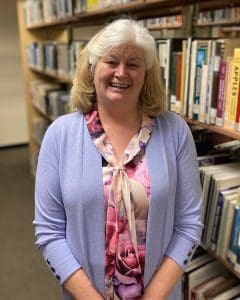 Sara Jones says she sometimes feels like she’s fighting an inferno with a spray bottle. As the Washington State Librarian, she is determined to stop censorship in libraries and says she plans to continue battling book suppression when she retires in a few years.
Sara Jones says she sometimes feels like she’s fighting an inferno with a spray bottle. As the Washington State Librarian, she is determined to stop censorship in libraries and says she plans to continue battling book suppression when she retires in a few years.
“I don’t want to be hyperbolic, but I think it’s a real existential threat to libraries,” says Jones, who graduated from Syracuse University’s School of Information Studies in 1999 with a Master in Library and Information Science. “I am putting as much energy into it as I possibly can. I don’t think it’s something that’s just going to go away. I think it’s got a stronghold in all parts of our country.”
Jones has worked in various libraries for more than 30 years and previously served as the Nevada State Librarian from 2000 to 2007. She says her work as the Washington State Librarian will be her last, but she plans to be a consultant for libraries across the country in retirement.
“I think there’s some real work ahead of us to make sure that libraries aren’t erased because people don’t want people to read certain materials,” Jones says. “I think it’s not only a threat to libraries, but I think it’s a huge threat to our democracy. We need to really activate a voter group to stand up and support their library.”
From Law to Libraries
Jones always loved libraries growing up but never imagined she would work in one. Her plan in college was to be a lawyer, but after getting married and moving to a small town, it wasn’t in the cards.
So, she decided to give teaching a try, a career her sisters and other family members loved. But after teaching for one year, she saw an ad for a part-time children’s library assistant, and she made the leap.
“I fell in love with library work,” Jones says. “It was way better than teaching because I didn’t have papers to grade or difficult parents. Everything was good about it. I could’ve really happily been a children’s librarian my entire career.”
Library management job opportunities eventually came along, and Jones decided to go for it. One job in particular, a library director position in Nevada, required a masters degree in library science – something Jones didn’t have. So she accepted the job with the promise that she would get her degree. To do that, she turned to Syracuse for help.
A Top-Tier School
Syracuse’s reputation as a top-tier school led Jones to enroll. She also loved the university’s hybrid in-person and online program that offered flexibility for a working professional’s life, a perk that not all colleges offered at that time in the 90s.
“I was already working full time as a library director, so I really wanted the best education possible to enhance my experience and opportunities. Syracuse provided that to me,” she says. “The quality of education I got at Syracuse gave me a lot of confidence.”
Jones hopes other Syracuse students and graduates feel that same sense of confidence. If she could offer any advice, she would tell students to feel proud of themselves and always be willing and ready to accept new challenges.
“Being accepted into the iSchool is a big deal. You are there because you are smart, talented and ambitious. Embrace it,” she says. “The best advice I received from mentors was: ‘Go for it! You can do it!’”
